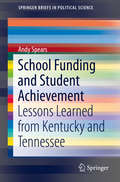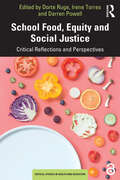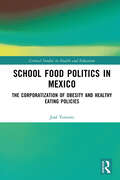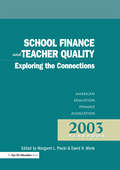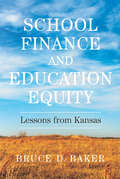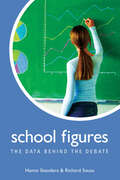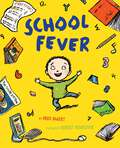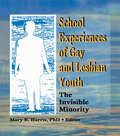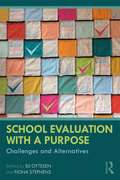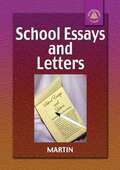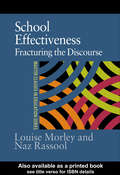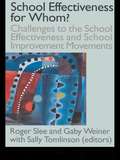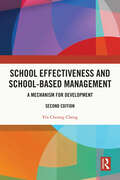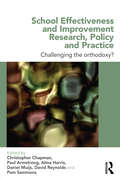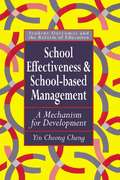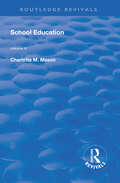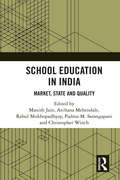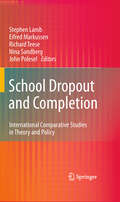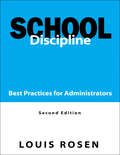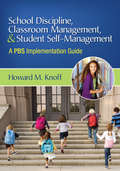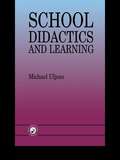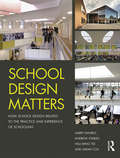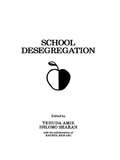- Table View
- List View
School Funding and Student Achievement
by Andy SpearsThis Brief explores school funding reform in the states of Kentucky and Tennessee. In 1990, Kentucky passed the Kentucky Education Reform Act designed to overhaul that state's education system. Two years later, Tennessee passed the Education Improvement Act which included the Basic Education Plan, designed to foster equity in funding among the state's schools. Initiated as a result of lawsuits against the states' educational systems, both programs dealt with school funding, specifically funding equalization among districts. This Brief examines the environments that precipitated funding reform in each state as well as the outcomes of the reforms on student achievement. The similarities and differences between the approaches in each state are analyzed and compared to related reform programs in other states. An in-depth study of regional educational reform in the United States, this Brief is of use to public policy scholars as well as education policy consultants and other school system or state education leaders.
School Food, Equity and Social Justice: Critical Reflections and Perspectives (Critical Studies in Health and Education)
by Darren Powell Dorte Ruge Irene TorresSchool Food, Equity and Social Justice provides contemporary, critical examinations of policies and practices relating to food in schools across 25 countries from an equity and social justice perspective. The book is divided into three sections: Food politics and policies; Sustainability and development; and, Teaching and learning about food. Bringing together an interdisciplinary group of academics with practitioner backgrounds, the chapters in this collection broaden discussions on school food to consider its educational and environmental implications, the ideals of food in schools, the emotional and ideological components of schooling food, and the relationships with home and everyday life. Our aim is to provide enhanced insight into matters of social justice in diverse contexts, and visions of how greater equality and equity may be achieved through school food policy and in school food programs. We expect this book to become essential reading for students, researchers and policy makers in health education, health promotion, educational practice and policy, public health, nutrition and social justice education.
School Food Politics in Mexico: The Corporatization of Obesity and Healthy Eating Policies (Critical Studies in Health and Education)
by José TenorioIntertwining policy analysis and ethnography, José Tenorio examines how, and why now, the promotion of healthy lifestyles has been positioned as an ideal ‘solution’ to obesity and how this shapes the preparation, sale and consumption of food in schools in Mexico. This book situates obesity as a structural problem enabled by market-driven policy change, problematizing the focus on individual behavior change which underpins current obesity policy. It argues that the idea of healthy lifestyles draws attention away from the economic and political roots of obesity, shifting blame onto an ‘uneducated’ population. Deploying Foucault’s concept of dispositif, Tenorio argues that healthy lifestyles functions as an ensemble of mechanisms to deploy representations of reality, spaces, institutions and subjectivities aligned with market principles, constructing individuals both as culprits for what they eat and the prime locus of policy intervention to change diets. He demonstrates how this ensemble enmeshes within the local cultural and economic conditions surrounding the provisioning of food in Mexican schools, and how it is contested in the practices around cooking. Expanding the conversation on the politics of food in schools, obesity policy and dominant perspectives on the relation between food and health, this book is a must-read for scholars of food and nutrition, public health and education, as well as those with an interest in development studies and policy enactment and outcomes.
School Finance and Teacher Quality: Exploring the Connections
by Margaret L. Plecki David H. MonkThe yearbook is organized around four issues, each of which can be viewed as representing an important focal point to improve teacher and teaching quality and having important implications for school finance. The issues are (1) teacher recruitment, induction, and retention; (2) the ongoing porfessional development of teachers; (3) equity in the allocation of teaching resources; (4) teacher compensation and workplace conditions.
School Finance and Education Equity: Lessons from Kansas
by Bruce D. BakerThis inspiring account of bipartisan political success delivers an expert breakdown of how and why Kansas—a politically conservative state—was able to craft a stable, balanced, and equitable system of funding for its public schools. Beyond a chronicle of one state&’s achievements, School Finance and Education Equity provides invaluable policy guidance and lays out a blueprint that other states can use to strengthen their own public education systems.Readers are given an insider&’s tour of the Kansas story by Bruce D. Baker, an academic researcher and expert witness in school finance litigation. With more than two decades of involvement with the state, Baker combines historical background, legal analysis, and political and economic contextual data—along with a gleaming wit—to present a thorough, enlightening narrative of Kansas&’s K–12 funding journey.As Baker points out, other states can find much to learn here. He shows that, when it comes to school finance, Kansas serves as an exemplar in aligning resources to meet the promises of its constitution. State leaders rejected the pervasive notion that money doesn&’t matter in education, and they gathered the data to prove that it does. Baker emphasizes that this kind of slow and steady success hinges on the ability of stakeholders to remain involved over time. Continuity is vitally important.Baker&’s account highlights how persistence can overcome opposition, continuity can aid reform, and incremental gains can lead to big change. In an era of national ideological polarization and political and economic volatility, the lessons from Kansas are especially illuminating.
School Figures: The Data behind the Debate
by Hanna Skandera Richard SousaSchool Figures presents statistics, along with historical trends and cross-sectional comparisons, to provide a clear, factual picture of today's K–12 education landscape, including information on school demographics, cost and finance, testing and achievement, public school reform, and other key areas.
School Fever
by Brod BagertA kid's-eye view of school, crammed with enough funny to fill a big yellow bus!Snappy and hilarious in true Brod Bagert style, these goofy poems are united by their kid authenticity and quirky school themes. From a computer virus that one kid claims is sure to keep him homesick until summer vacation, to the librarian who tames "the savage beast" (a mouse run amok in the library), to a superhero recruited to scare off the school bully, this is most definitely not your typical poetry collection. Robert Neubecker's bright, dynamic artwork propels each poem into another stratosphere of funny. By the end, kids will have contracted a different strain of school fever altogether."Kids will appreciate the humor and will see themselves in the high-energy narrator"—Booklist
School Experiences of Gay and Lesbian Youth: The Invisible Minority
by Mary B HarrisSchool Experiences of Gay and Lesbian Youth: The Invisible Minority shows teachers, youth advocates, administrators, and academic researchers how to embrace the needs of sexual minority students. Through research and case studies, this book explains the ways in which schools are failing the vulnerable population of gay, lesbian, and bisexual youths. This text shows you how to take responsibility for recognizing and protecting the rights and needs of gays and lesbians and ridding schools of discrimination, harassment, and violence.As School Experiences of Gay and Lesbian Youth illustrates, the consequences of the cognitive, social, and emotional isolation that sexual minority youths experience as a result of homophobia and heterosexism can be devastating. With this book’s helpful suggestions, provocative insight, and open challenges, you can help gay and lesbian youths develop feelings of self-worth as well as positive aspirations for their futures. Experiences of Gay and Lesbian Youth will help social workers, psychologists, academics, counselors, and other professionals understand: the dearth of role models in the career development of lesbian and gay youths how to integrate sexual orientation into career counseling how to incorporate the topic of homosexuality into educational curricula forms of homophobia (from the victim’s and the agressor’s points of view) and heterosexism in the high school environment how to open discussions about gay and lesbian issues at school the importance of having visible lesbian, gay, and bisexual staff who can provide support for sexual minority youthSchool Experiences of Gay and Lesbian Youth also informs you on the experiences gay and lesbian adults who attended high school five to fifty years ago, as well as college students who have reported incidents of homophobic behavior in high school. In addition, this text discusses teachers’fears of being fired as a result of talking about sexual minority issues and how school environments can lead students to become drop outs. Experiences of Gay and Lesbian Youth will inform you on the issues facing gay and lesbian youth and provide you with suggestions on how to make the classroom a welcoming environment, regardless of sexual orientation.
School Experience: Explorations in the Sociology of Education (Routledge Library Editions: Sociology of Education #60)
by Martyn Hammersley Peter WoodsFirst published in 1977, this volume brings together a range of viewpoints, informed by reports of empirical research, which bear on the experience of school. Each chapter demonstrates the application of the ‘new sociology of education’ in its various guises to the world of teachers and pupils. In doing so, they exemplify the fields of investigation opened up by these theoretical developments, and also suggest directions ahead. The tensions in the articles reflect the tensions that existed in the sociology of education. By bringing them together, the aim of this volume is to contribute to a more soundly based sociology of education.
School Evaluation with a Purpose: Challenges and Alternatives
by Eli Ottesen Fiona StephensSchool evaluation is often linked to issues of accountability, performance assessment, regulation and inspection, where the work of teachers and/or the functioning of the school becomes the subject of critique. School Evaluation with a Purpose explores the latest thinking surrounding external and self-evaluation in schools. Examining teacher professionalism, reflective practice and what really matters in education, it considers the key challenges around current evaluative practice and puts forward alternative methods of evaluation, placing reflective practice and teacher professionalism at its heart. Exploring the stories of evaluation and the practice of resilient schools and school leaders in five European contexts, the book aims to support and promote the agency of teachers, school leaders and students. This book will be of particular interest to school leaders internationally, researchers, master's students of Education and Education Leadership, and policymakers responsible for law enforcement in the field of school inspection.
School Effectiveness: Fracturing the Discourse (Master Classes In Education Ser.)
by Louise Morley Naz RassoolHow have the school effectiveness and school improvement movements arrived where they are today? Over the past three decades there has been a great deal of development, from the 1960s when debates arose regarding equality of opportunity, to the 1980s when market concepts came into play. This book contrasts current thinking on educational standards with prevailing thought from prior decades, and tackles difficult questions of quality and educational outcomes. Anyone wishing to improve their understanding of school effectiveness will find this book interesting and highly informative.
School Effectiveness for Whom?: Challenges To The School Effectiveness And School Improvement Movements
by Roger Slee Sally Tomlinson Gaby WeinerSchool effectiveness research together with what is now described as the 'school improvement movement' (Barber, 1996) has captured both the Conservative and New Labour imaginations as a basis for educational planning and policy making in the UK. Internationally school effectiveness enjoys and expanding and enthusiastic audience.This book provides a critique of this research genre, particularly in the light of the recent calls for teaching to go 'back to the basics'. The editors argue that this school effectiveness research is simplistic in its analysis of educational problems. Far from getting to the bottom of the problem of failing students and schools, they argue, these 'movements' are merely scratching at the surface of the problems and coming up with notions for superficial improvements.
School Effectiveness and School-Based Management: A Mechanism for Development
by Yin Cheong ChengThis new edition of an internationally renowned classic book provides a new comprehensive framework of latest perspectives and findings, fills gaps in the ongoing research, policy and practice, and re-engineers a school-based mechanism for understanding and managing school-based development initiatives. The book addresses the burning issues about how school-based management (SBM) and school effectiveness should be related to the new paradigm in education and the third wave of education reforms worldwide. The book includes four parts and 12 chapters covering (1) School Effectiveness (i.e., multiple school functions, models of effectiveness and pursuit of dynamic effectiveness); (2) SBM (i.e., theories of SBM, multi-level self-management (SM), and its implementation); (3) Leadership for Change (i.e., leadership for SBM, staff development, school-based change, and curriculum change); and (4) Future Developments (i.e., an SBM mechanism for effectiveness and paradigm shift towards the third wave). The framework and related analysis will benefit the understanding, policy formulation, school practice and research of the key stakeholders including policy makers, educators, change agents, researchers and those concerned in facing the challenges from the ongoing education reforms in different parts of the world.
School Effectiveness and Improvement Research, Policy and Practice: Challenging the Orthodoxy?
by David Reynolds Daniel Muijs Alma Harris Paul Armstrong Christopher Chapman Pam SammonsThis book provides a contemporary overview of school effectiveness and improvement. It charts the development theory and research in this area and looks at the contribution made to policy and practice. It also challenges some assumptions that have become ingrained into the theoretical and methodological traditions of the field. By challenging these orthodoxies, it provides a framework that sets a new agenda and repositions the field to meet the emerging challenges of the twenty-first century. It argues that traditional measures of school effectiveness are challenged as systems have attempted to adapt to a complex range of emerging agendas. New theoretical perspectives are required which consider 'education' and a 'broader set of outcomes'. This shift requires a rethink of how effectiveness and improvement have been understood by the field, and a reconstruction by policy makers and practitioners. Attention must be given to promoting equity as well as effectiveness so that one school or student's gain no longer means another's loss. The field must develop new methodologies if inequities are to be challenged and a broader set of outcome measures are to be developed. The two questions guiding this book are: How can educational effectiveness and improvement research and practice support the development of a more equitable education service? What are the key indicators of educational effectiveness and improvement and what are the new methodologies required to facilitate a shift from 'school' effectiveness and improvement to 'educational' effectiveness and improvement? This book uses lenses of research, policy and practice to explore these key questions and articulate what such a repositioning may look like and how it may be achieved. It will prove invaluable for teachers, school leaders and anyone involved in policy and educational research.
School Effectiveness and Educational Management
by Nikša Alfirević Josip Burušić Jurica Pavičić Renata ReljaThis book analyzes educational management in the context of developing effective schools in South-Eastern European countries and situates the discussion within ongoing education debates in EU countries. The book revolves around the specific role and practices of school principals, who are positioned as a nexus of educational management in each school. Presenting innovative research in the field of educational management and effectiveness this volume will be invaluable for a range of education specialists.
School Effectiveness And School-Based Management: A Mechanism For Development
by Yin Cheong ChengThe aim of this book is to bridge the widening gap between ongoing educational reforms and the lack of advances in knowledge, research and practice. Included is a description of new mechanisms in fields such as leadership, staff development and curriculum change.
School Education: Volume Iii (Routledge Revivals)
by Charlotte M. MasonOriginally published in 1905, this book argues that the educational outlook was rather misty and depressing both at home and abroad. That science should be a staple of education, that the teaching of Latin, of modern languages, of mathematics, must be reformed, that nature and handicrafts should be pressed into service for the training of the eye and hand, that boys and girls must learn to write English and therefore must know something of history and literature; and, on the other hand, that education must be made more technical and utilitarian - these, and such as these, are the cries of expedience with which we take the field. But we have no unifying principle, no definte aim; in fact, no philosophy of education.
School Education in India: Market, State and Quality
by Christopher Winch Manish Jain Archana Mehendale Rahul Mukhopadhyay Padma M. SarangapaniThis volume examines how the public and private domains in school education in India are informed and mediated by current market realities. It moves beyond the simplistic dichotomy of pro-state versus promarket factors that define most current debates in the formulations of educational reform agendas to underline how they need to be interpreted in the larger context. The chapters in the volume present a series of conceptual and empirical investigations to understand the growth of private schools in India; investigate the largely uncontested claims made by the private sector regarding provision of superior quality of education; and their ability to address the educational needs of the poor. Further, the book looks at how the private–public dichotomy has been extended to professional identity of teachers and teaching practices as well. <P><P>Rich in primary data and supported by detailed case studies, this volume will be of interest to teachers, scholars and researchers dealing with education, educational policy, school education and public policy. It will also interest policy makers, think tanks and civil society organisations.
School Dropout and Completion
by Stephen Lamb Richard Teese John Polesel Eifred Markussen Nina SandbergSchool dropout remains a persistent and critical issue in many school systems, so much so that it is sometimes referred to as a crisis. Populations across the globe have come to depend on success at school for establishing careers and gaining access to post-school qualifications. Yet large numbers of young people are excluded from the advantages that successful completion of school brings and as a result are subjected to consequences such as higher likelihood of unemployment, lower earnings, greater dependence on welfare and poorer physical health and well-being. Over recent decades, most western nations have stepped up their efforts to reduce drop out and raise school completion rates while maintaining high standards. How school systems have approached this, and how successful they are, varies. This book compares the various approaches by evaluating their impact on rates of dropout and completion. Case studies of national systems are used to highlight the different approaches including institutional arrangements and the various alternative secondary school programs and their outcomes. The evaluation is based on several key questions: What are the main approaches? How do they work? For whom do they work? And, how successful are they in promoting high rates of completion and equivalent outcomes for all? This book examines the nature of the dropout problem in advanced industrialized countries with the goal of developing a broader, international understanding that can feed into public policy to help improve completion rates worldwide.
School Discipline: Best Practices for Administrators
by Dr Louis RosenLoaded with updates, this newly revised second edition gives administrators all the tools they need to create a safe environment for both educators and students.
School Discipline, Classroom Management, and Student Self-Management: A PBS Implementation Guide
by Dr Howard M. KnoffAn integrated, comprehensive approach to positive behavioral supports and interventions This book provides a pragmatic, easy-to-follow blueprint for Positive Behavior Support Systems (PBSS) implementation that integrates academics, instruction, and achievement with discipline, behavior management, and student self-management. Award-winning author Howard M. Knoff provides guidance on: Implementing a schoolwide discipline and safe schools program Teaching students interpersonal, social problem solving, conflict prevention and resolution, and emotional coping skills Guiding professional development, staff and student buy-in, and evaluation Strengthening parent and community outreach and involvement Included are charts to post in classrooms, worksheets, and action items. Research-based case studies demonstrate how PBSS activities create positive climates, pro-social interactions, and effective management approaches.
School Didactics And Learning: A School Didactic Model Framing An Analysis Of Pedagogical Implications Of learning theory
by Michael UljensIn this book a new theory on instruction is presented - a reflective theory of school didactics - uniquely incorporating continental German and Nordic research traditions in the theory of didactics (Didaktik), together with Anglo-American research on teaching (instructional research) and cognitivist theory. School didactics is defined as a field of research within general education. This field is limited to research and theory aiming at understanding the pedagogical practice which takes place in institutionalized educational settings guided by a curriculum collectively agreed upon. As the theory is designed to be valid for institutionalized education framed by a politically accepted curriculum, it is a culturally seen regional theory of education, not a universal one. According to this school theory the fundamental features of an institutionalized pedagogical process consist in the intentional, interactional, teaching-studying-learning process that is culturally and historically developed and situated. However, the present model does not explicitly formulate goals nor the means of educational practice. Rather, the model emphasizes the teacher and student as reflective and intentional subjects where the teacher is acting as the representative of the collective but also as the learners' advocate. Because of this the theory presented is not a normative or prescriptive theory, instead it is a reflective theory.
School Design Matters: How School Design Relates to the Practice and Experience of Schooling
by Harry Daniels Andrew Stables Hau Ming Tse Sarah CoxPresenting qualitative and quantative findings from the unique, multi-disciplinary project, Design Matters?, this timely book explores the complex relationship between school design and practice to consider how environmental aspects impact on the day-to-day perceptions, actions and behaviours of pupils, teachers, leaders and professionals within the school community. Exploring debates and issues from a number of different professional and academic perspectives, School Design Matters results from a rich collaboration between schools, architects, engineers, educationalists and policymakers to consider what an inspiring teaching and learning environment might look like. Case studies and first-hand student and teacher experience allow analysis of the ways in which environmental factors might transform pedagogy, shape patterns of leadership, improve student engagement and enhance social interactions within and beyond the school community. Experts in their fields, authors acknowledge the significance of sociocultural contexts, reference relevant policy, and tackle the tensions, dilemmas and contradictions which frequently arise as schools and professionals in the design and construction sectors collaborate in the creation of buildings which fulfil the needs of diverse, invested parties. Offering a uniquely holistic approach to understanding the ways in which design may contribute, shape and mediate teaching and learning, this comprehensive text will be essential reading for educationalists, architects, policymakers and professionals involved in the design, construction and use of school buildings.
School Desegregation: Cross-cultural Perspectives
by Yehuda Amir and Shlomo SharanPublished in the year 1984, School Desegregation is a valuable contribution to the field of Education.
